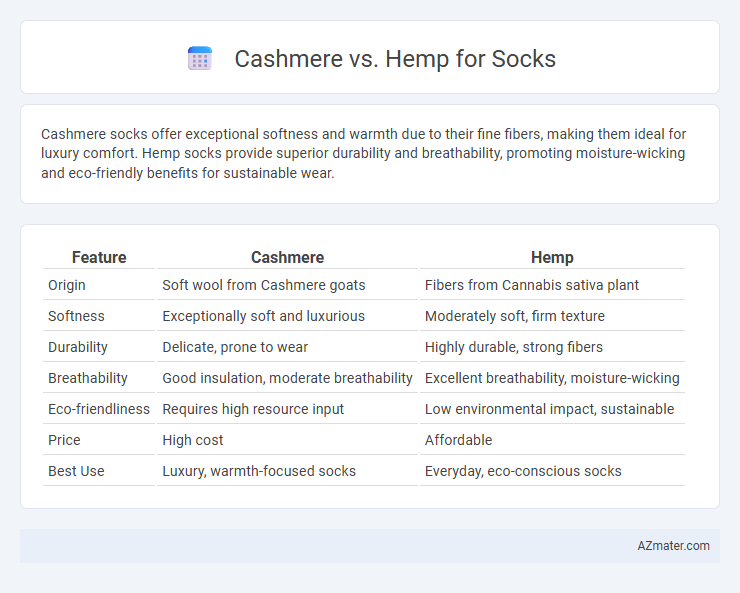Cashmere socks offer exceptional softness and warmth due to their fine fibers, making them ideal for luxury comfort. Hemp socks provide superior durability and breathability, promoting moisture-wicking and eco-friendly benefits for sustainable wear.
Table of Comparison
| Feature | Cashmere | Hemp |
|---|---|---|
| Origin | Soft wool from Cashmere goats | Fibers from Cannabis sativa plant |
| Softness | Exceptionally soft and luxurious | Moderately soft, firm texture |
| Durability | Delicate, prone to wear | Highly durable, strong fibers |
| Breathability | Good insulation, moderate breathability | Excellent breathability, moisture-wicking |
| Eco-friendliness | Requires high resource input | Low environmental impact, sustainable |
| Price | High cost | Affordable |
| Best Use | Luxury, warmth-focused socks | Everyday, eco-conscious socks |
Introduction: Cashmere vs Hemp Socks
Cashmere socks offer unparalleled softness and insulation, making them ideal for cold weather and luxury comfort. Hemp socks provide exceptional durability, breathability, and natural antimicrobial properties, ensuring long-lasting wear and moisture control. Comparing cashmere vs hemp socks highlights a choice between premium warmth and sustainable resilience.
Material Origins and Sustainability
Cashmere socks are crafted from the soft undercoat of cashmere goats primarily found in Mongolia and China, offering exceptional warmth and luxury but requiring intensive land and water resources. Hemp socks, derived from the fast-growing Cannabis sativa plant, excel in sustainability due to minimal water needs, natural pest resistance, and biodegradability. Choosing hemp over cashmere supports eco-friendly production practices while providing durable, breathable, and antimicrobial sock material.
Softness and Comfort Comparison
Cashmere socks are renowned for their exceptional softness, providing a luxurious and plush feel that enhances comfort during wear. Hemp socks offer a more durable and breathable texture but lack the same silky softness found in cashmere, making them ideal for those who prioritize longevity and moisture-wicking properties. When comparing comfort, cashmere socks excel in warmth and gentle cushioning, while hemp socks excel in durability and odor resistance for extended use.
Durability and Longevity
Cashmere socks offer exceptional softness but tend to wear out faster due to the delicate nature of cashmere fibers, making them less durable over time. Hemp socks provide superior durability and longevity, as hemp fibers resist abrasion and strengthen with washing, maintaining their shape and resilience. Choosing hemp socks ensures longer-lasting wear, especially for active use, while cashmere suits short-term luxury comfort.
Breathability and Moisture-Wicking
Cashmere offers exceptional softness but has limited breathability and moisture-wicking properties compared to hemp. Hemp fibers provide superior air flow and natural moisture control, making them ideal for breathable, dry socks. The antimicrobial qualities of hemp further enhance comfort during prolonged wear, outperforming cashmere in moisture management.
Warmth and Insulation Properties
Cashmere socks offer superior warmth due to their fine fibers that trap heat efficiently, making them ideal for cold weather. Hemp socks provide excellent insulation and breathability, balancing warmth with moisture-wicking properties to keep feet dry. While cashmere excels in thermal insulation, hemp is more durable and antimicrobial, offering long-lasting comfort.
Allergen and Skin Sensitivity Factors
Cashmere socks offer a luxurious softness but may cause allergic reactions or skin irritation in individuals sensitive to animal fibers such as lanolin. Hemp socks provide a hypoallergenic alternative with natural antimicrobial properties, reducing the risk of skin irritation and fungal infections. For sensitive skin, hemp's breathability and moisture-wicking capabilities enhance comfort and minimize allergen exposure compared to cashmere.
Eco-Friendliness and Environmental Impact
Cashmere socks offer luxurious softness but have a high environmental impact due to intensive water use and land degradation from goat farming. Hemp socks are significantly more eco-friendly, requiring less water, fewer pesticides, and regenerating soil health, making them a sustainable alternative. Choosing hemp supports lower carbon footprints and promotes biodiversity compared to the resource-intensive cashmere industry.
Style, Color, and Fashion Considerations
Cashmere socks offer a luxurious, soft texture with a natural sheen that enhances classic and high-end fashion styles, often available in neutral tones like beige, gray, and navy. Hemp socks provide a more rustic, eco-friendly aesthetic with earthy colors and subtle textures, appealing to sustainable fashion trends and casual wear. Considering color versatility, cashmere pairs well with formal attire while hemp complements relaxed, natural wardrobes, making each material suitable for distinct fashion statements.
Price, Value, and Accessibility
Cashmere socks generally carry a higher price due to the luxury nature of cashmere fibers, which offer exceptional softness and warmth but come at a premium cost. Hemp socks are more affordable, providing durability and breathability while appealing to eco-conscious consumers seeking sustainable and cost-effective options. Accessibility favors hemp, as it is widely available and easier to produce, whereas cashmere remains niche and often limited to specialty retailers.

Infographic: Cashmere vs Hemp for Sock
 azmater.com
azmater.com